
The weekend of the 20th of April saw Chesterville hosting its annual tutor training session at the Steve Biko campus at DUT. This tutor training session had been planned from the SPW weekend and to see it come alive in the way that it did made it an eventful day for all involved.
With a high number of new tutors this year, this experience was going to contribute to them being more knowledgeable about tutoring and IY’s oh so prevalent and distinct 1:5 ratio.
The session began with an icebreaker that at the end of it, all tutors were lightened up and ready to begin the session. Nelisa Luhabe (Branch Coordinator) welcomed everyone with open arms and set the tone for the day. The team began with revising and asking questions regarding information on the tutor training guide, Cheryl Nzama (Branch Assistant) and Nelisa then guided the team with answers and outlined the essentials of tutoring and how to deal with learner dynamics as a tutor. The tutor training guide also emphasizes all aspects that one needs to know in order to be a diligent tutor for the branch.
Fast forward to the activity “how to park a car”, if you are familiar with this activity then you would know how important it is that it be included in our tutor training session. In short the activity aims to help the tutor and everyone involved to know how to analyse a situation, share opinions in a group, to actively listen and most importantly to give each learner in that group equal attention. This activity saw tutors having what some would call “aha moments”, they better understood that no two learners are the same, that each learner understands/develops at a different pace and that for a tutor, it’s ok to say “I don’t know however I will call in another tutor to come in and assist” and that is how one of our values “peer to peer support” starts showing up.
Working in an environment with learners and tutors means that everyone needs to be armed with knowledge on how to deal with conflicts and the likes. So the activity ‘Metaphor of fire” tackled that in every sense.
The day ended with everyone carrying the responsibility of ensuring that Chesterville still maintain its 100% matric pass rate and to also focus more on making sure that all learners produce quality marks in all the grades. Tough ask! however with commitment and diligence from everyone involved, what’s impossible again? Nothing!!

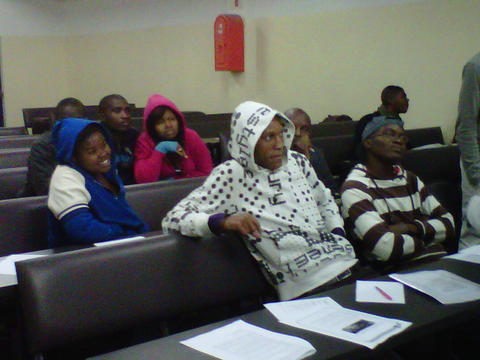
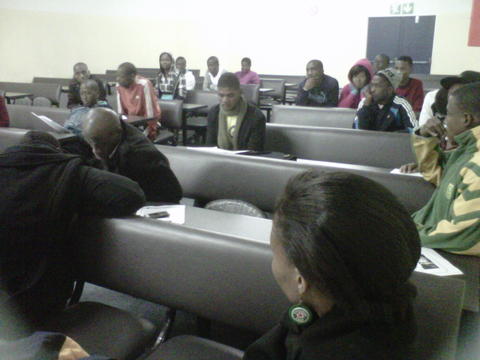
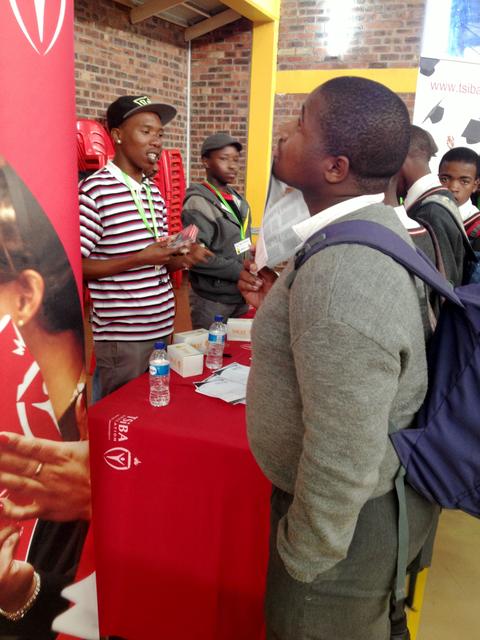
This years Careers Indaba, organised in partnership with Equal Education and SAEP, saw nearly 1000 leaners come though the doors of the Zolani Centre, all coming to gain valuable exposure to organisations, workshops and other important resources.
The aim on the Indaba is to provide learners with information that will assist them in making informed decisions; a fundamental step in fostering a mind set in the youth of South Africa of pro-active future orientated thinking. It is challenging to dream of a better future and to aspire to goals without knowing the realities of these goals and the opportunities that are available.

The annual Careers Indaba is a chance for leaners to obtain information on where to continue their studies, start working; find out about on the job training, as well as alternatives to studying through volunteer programs or internships. It gives them a chance to investigate their options and talk directly to the people who are able to guide them in the right direction. In addition Career Planet and Kayin from SAEP also offered workshops on CV building, interview techniques and personal development. Skills that are needed wherever your path takes you.
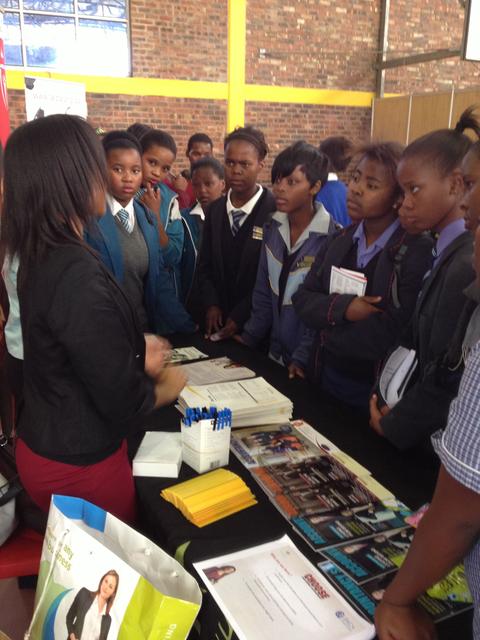
While protests on the freeway kept a few exhibitors away, it didn’t damper the spirit of the learners who came, and a few had this to say,
Kuhle, “I learnt that I have to be confident and choose a career that will require my talents and abilities.”
Zasipho, “I have learnt about my career, where to study, how and where to apply for bursaries and how to be successful in future.”
Ludwe, “I have learnt that even if you come from a poor family you can get a bursary and go further with your education.”
Sikelelwa, “I have learnt that education is your ticket to success and you have to have dreams in order to succeed. Everything you do is all about knowing what you truly want out of life.
Ngeke, “That you must know what you want and understand your chosen career. Understand the advantages and disadvantages of it.”
Anathi, “I have learnt that there are many opportunities for youth out there so there’s no excuse of not having money or being poor.”
Nosiphiwo, “I learnt that in order for me to achieve my dream career I need to focus on my studies so that I can get better results at the end of the year.”
The day would not have been possible without our amazing partnership with Equal Education and SAEP – big up to them!
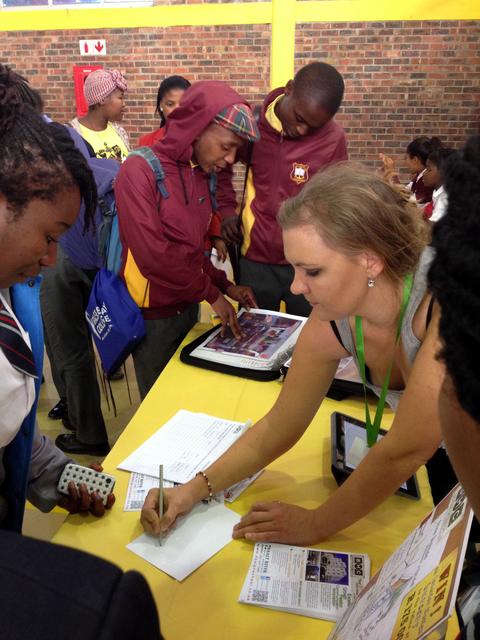
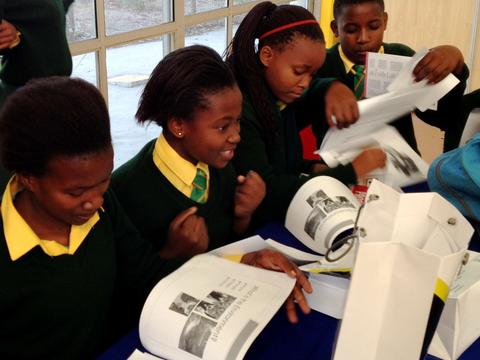
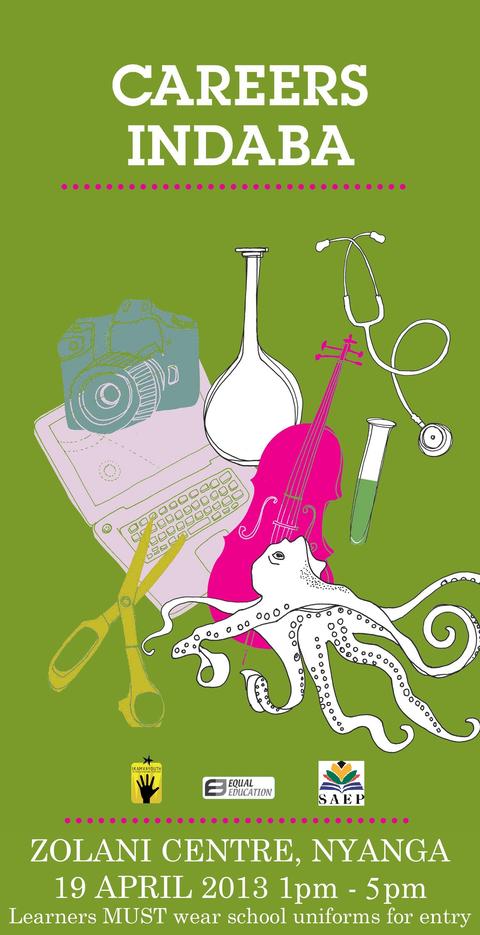
This week IkamvaYouth, Equal Education and the South African Education and Environment Project (SAEP) will host the annual Careers Indaba.
Businesses, NGOs, professionals, tertiary institutions and Further Education and Training colleges will run information stalls to grade 8-12 students from Khayelitsha, Nyanga, Makhaza, Strand, Kraaifontein, Masiphumelele and surrounding areas.
DATE: Friday, 19 April 2013
TIME: 13h00-17h00
VENUE: Zolani Centre, Sithandatu Avenue, Nyanga, 7750
ENTRY: free
Come wearing your school uniform!
Many learners face challenges when considering their tertiary studies. These challenges include insufficient access to information regarding academic and occupational options as well as affording the cost of further studies.
The Career Indaba provides assistance to learners making decisions about their future. Exhibitors will expose learners to a variety of careers paths and options. Learners will also have the opportunity to learn about scholarships and bursary programs that are available to them.
The programme will include workshops on CV writing, interviewing skills, personal development and study techniques.
For more information:
Marion Petersen
marion@ikamvayouth.org
m: 0798854388
t: 0214224306
Kate Wilkinson
kate@equaleducation.org.za
t: 0213870022
e: 0716824515
Lydia Wasilenko
lydia.eva@live.com
t: 0213870022

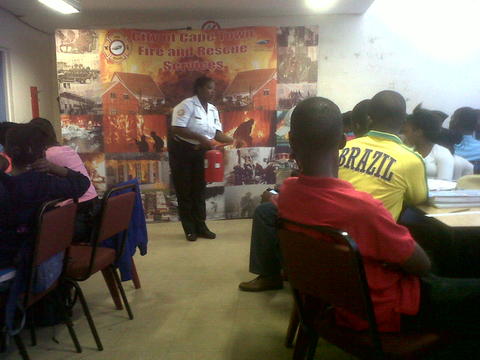

On Saturday 9 March, IkamvaYouth in partnership with Capitec presented a fire safety awareness workshop hosted by Mrs Nombeko Kopele (Public Education Officer) from the fire and rescue services in Ottery, Cape Town. In December 2012, close to a 1000 shacks burnt down in Khayelitsha with countless people being displaced and with winter approaching, a time when the risks of fires increase, it was an opportune time to educate our learners about the dangers that fires pose, but also give them tips on how to avoid these fires.
The presentation were in two parts, first with the grade 10, 11 and 12s and then with the grade 8 and 9s. The reason for this split was because different aspects were discussed with the different age groups. Although the main focus of the workshop was fire safety awareness, it also allowed the presenter to speak to the older kids about the different careers within fire and rescue. This was very exciting for the ikamvanites because they found out that the training to become a fire fighter or paramedic is only 6 months and that it was really physical. They had a lot of questions to ask and the presenter was very knowledgeable and answered all their questions. Lwazi Fanana, a grade 11 learner, said afterwards that he might consider a career in the fire and rescue field. Another learner Sipho Nqgayimbana, grade 12, asked about the different careers within the fire and rescue fields and the presenter said that careers vary from administration, management, medical to paramedical and firefighting, etc., and that there are lots of skills shortages in this career field and with that a lot of opportunities for young people to join.
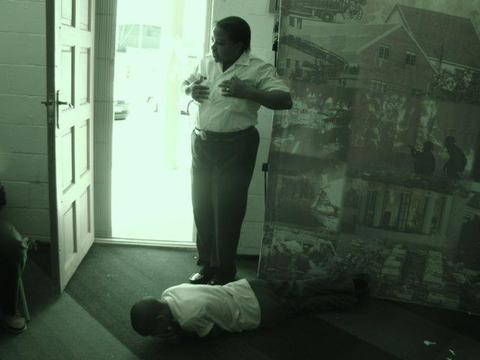
For the younger grades, the focus were more on fire prevention tips, what to do in case of a fire or burn injuries and who to contact when you see a fire. The session with them were more interactive and the ikamvanites were able to simulate scenarios, like rolling on the ground when you catch fire, and were shown charts of what to do. All the ikamvanites were told where their closest fire station is and were told to call 107 or 0215901900 in case of a fire or any other emergency. Everyone had a lot of questions for Mrs Kopele and as with the other group; she was able to answer every question.
We would like to thank the City of Cape Town and in particular Mrs Nombeko Kopele and Mr Abdusalaam Allie, Capitec and everyone that assisted with this workshop.
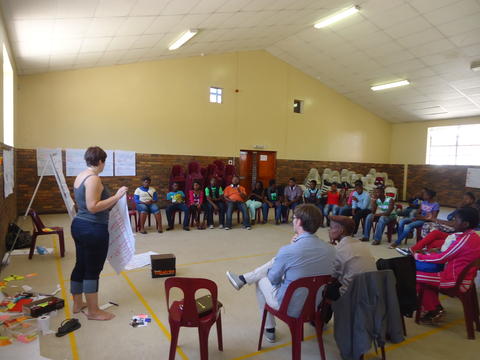

The weekend consisted of planning for 2013 as well as an election to choose the new branch committee as well as choosing the different heads of the different portfolios. Present were more than 30 learners from different grades and tutors and they all had a chance to discuss the decision making, planning and electing the branch committee.
The Main goal of our SPW was to elect a branch committee (in charge of roles and portfolios) and for new volunteers (grade12 from last year returning) to take ownership of programme and become part of the management team. It was also a great weekend for the leaner reps and tutors to get to know each other better.
On Saturday we discussed the year program and we also had a look back at what happened in 2012. The morning started off with an introduction and the group explaining what their expectations of the weekend will be, we then discussed what happened in 2012 and then we ended with looking at what IkamvaYouth is doing well, what challenges we are facing, what IkamvaYouth is offering learners and the community and what we can do to improve the programme. We had a lot of first time branch committee members, but the rest of the group made them all feel included and welcome.
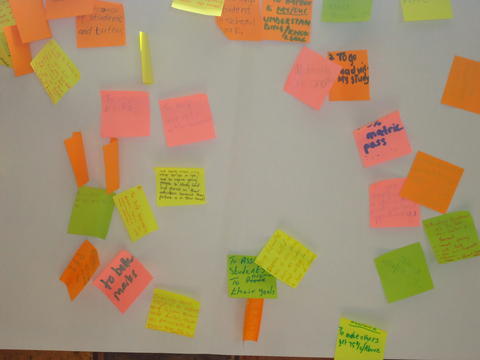
On Sunday the election took place and everyone had a chance to vote for the different nominees. The nomination and election process were very democratic and the nominees had to explain to the group why they were best suited for the different portfolios. The different portfolios were Tutoring, Volunteer Coordination, Career Guidance, Media, Image and Expression, Computer Literacy, Health and Life Skills and Alumni.
The different portfolio members also had to discuss their portfolios and present a plan of action for the group and will need to present this plan of action to all the Ikamvanites at Makhaza. They had to present their goals, when the goals should be reached and by whom. Emihle, a grade 8 learner and newly appointed portfolio member said that the weekend was a dream come true and that she enjoyed the interaction and discussions that took place and that she is really happy and proud for being chosen as part of the health and life skills portfolio.

Mandisi Gladile, a tutor says, “the weekend was really informative and made me realise the value IkamvaYouth adds not only to the learners but also the community and I feel really inspired for the things that we have planned for 2013.”
strategic_planning_week_2013.pdf
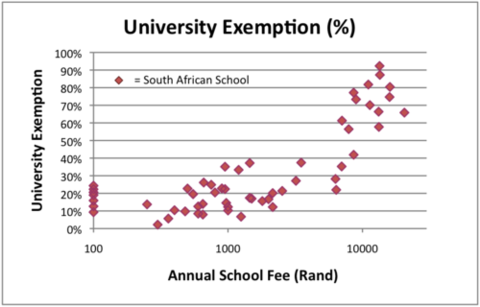
Just over a year ago I was approached by Andrew Einhorn, a UCT grad student, who was interested in implementing an online maths program at Makhaza. All he needed was access to the lab, access to a class and a tutor. A year down the line not only he has completely revamped two of our branches labs in Makhaza and Nyanga, established a formal Khan Academy program in these branches (as well as other locations in Cape Town and rural Eastern Cape), but has produced results at very low costs, and is piloting in schools for 2013.
His passion for creating high impact and stimulating learning environments in township and rural locations often only privy to the wealthy few has seen him start Numeric, an NGO interested in finding ways to bring Khan Academy to South Africa and make it a useful resource to both teachers and learners. He presented an inspiring TEDxUCT talk last year outlining the background, as well as the impact and results Numeric has had. He also posted the following blog on the Khan Academy website:

A little over 15 months ago, we started an experiment. We wanted to know if Khan Academy was viable in township (slum) areas in South Africa and if so, what type of impact it might have on numeracy. Numeracy in South Africa is astonishingly weak, with just 2% of Grade 9s scoring over 50% on the annual national assessments in 2012.
And so we set out to see if Khan Academy might be used as a catalyst for change. But before I expound on the results of this experiment, I ought perhaps give a little more background on the environments we’re working in.
Townships in South Africa are not unlike the favelas of Brazil or the slums bordering Delhi and Calcutta in India. They are urban areas that were, until the end of Apartheid in 1994, reserved for non-whites, but have now become residential hubs for the urbanizing masses. They are typically built on the periphery of cities and tend to be characterized by high population density, poverty and unemployment. Picture a ramshackle of makeshift houses constructed out of corrugated iron, wood scraps and cardboard, jigsawed together into a gigantic maze 5 miles wide and 10 miles across. At the risk of generalising grossly, that’s more or less the picture I want you to have in mind as you read this article.
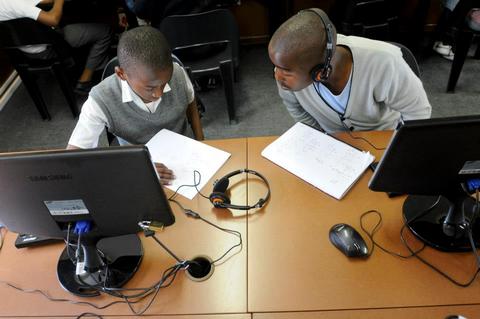
Now, townships in South Africa get a bad rap. They are viewed as ‘dangerous’ places and it is considered unwise to visit them unless you know someone there, or visit them as part of a ‘township tour’. Yet while crime rates in these areas are often high, the reputation does not do justice to the vibrant and persevering people who inhabit them. In particular, townships are YOUNG! On any given day, around two o’clock in the afternoon, the streets flood with uniformed, backpack-toting children on their way home from school. And despite having barely two pennies to rub together, they are meticulously dressed – shiny black shoes, starched white collars – and have aspirations to match. Most of the children in South Africa live in some form of township, which means that children growing up in these environments constitute the better part of the future of our country.
And yet it is supremely difficult to convince our best teachers to go and work in these areas. They are offered good jobs in well-resourced schools most often located in the wealthy suburbs of the cities. Principals at these schools compete fiercely for their skills. And this is as it should be. But it also entrenches the educational bias whereby a child’s access to quality education is directly proportional to the wealth of their family (see chart below).

* University exemption rate refers to the percentage of learners who attain the academic marks in their final year of school that are necessary to gain access to South African universities.
So Numeric’s experiment was to see whether we could use Khan Academy, in conjunction with a slightly less skilled (and often unqualified) math coach, to create the high impact and stimulating learning environments enjoyed by kids living in wealthier suburbs.
The opportunity provided by Khan Academy premised on the following: Videos do not argue about where they are played; they are unaffected by crime and environment. Appropriately licensed, they do not cost anything. They do not grow weary, skip class, or grow jaded. Instead, they convey their message enthusiastically, faithfully, clearly – time and time again. A child may watch just as many videos as he/she has appetite for, and need never feel limited by the dragging on of a boring class or an inept teacher. For many children in South Africa, a Khan Academy video will be their first exposure to what we might term ‘world class instruction’. When complemented by the exercises on the Knowledge Map, Khan Academy becomes a powerful tool for turning the tide on numeracy in South Africa.
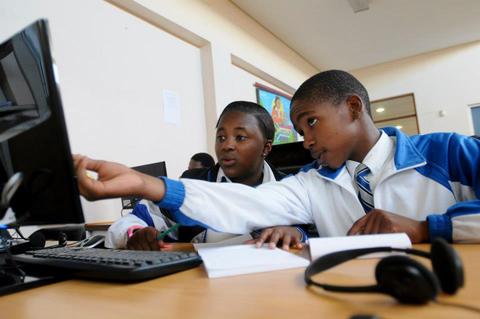
So what were the results of the experiment? Well, it’s probably too early to draw any major conclusions, but we do have a few figures we’d like to share. We currently run 7 Khan Academy classes across 3 different hubs in the Eastern and Western Cape provinces of South Africa. The first pilot group of 20 Grade 9s has just completed its first twelve months of Khan Academy and their numbers are as follows:
* Total Khan Academy hours delivered: 2220
* Total Problems Solved: 27,988
* Total Problems per learner: 1399
* Total Khan Modules Complete: 1232
* Average Modules per learner: 62
Bearing in mind this is an afterschool programme, these are 27,988 math problems that would not otherwise have been attempted. The 62 modules completed by the average learner constitute 62 gaps that those learners have filled. But it’s more about just the numbers; it’s about creating excitement and enthusiasm around learning. This is hard to convey in words, but perhaps a picture will suffice.

As we always say to our coaches, the tragedy in South Africa is not so much that kids don’t want to learn. It’s that some kids DO want to learn, but can’t. Khan Academy provides us one way to give these kids a world-class education without having to magically replenish our nation’s supply of teachers. And who knows, perhaps one day these kids will become the inspirational and talented teachers we have waited for for so long!
—-
Andrew Einhorn is the founder and current CEO of Numeric.org. His TEDx talk on Numeric.org and Khan Academy is available here.
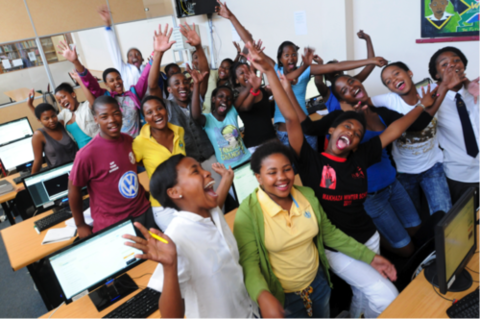























 Lloyd Lungu
Lloyd Lungu